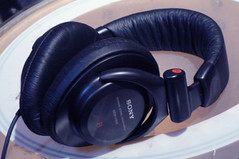B. Thomas Cooper
Editor
It's the dream of every aspiring musician. Whether one is a member of the hardest working club band in town or the next fresh face on American Idol, rest assured they long for a crack at that mythical pot of gold, the recording contract.
But what exactly is a recording contract? If you just shrugged your shoulders you answered correctly. You see, there are as many types of recording contracts as the mind can imagine.

As a staff producer for Power Station Records, one of my duties was finding and developing new talent for the label. In the music industry this is usually referred to as A&R, or Artist Development. The larger record labels may have several persons working A&R. None of them think alike and thus each may specialize in a specific genre. Furthermore, just because one guy in the office hates your new demo doesn't mean everyone else in the room feels the same.
A motivated musician learns quickly to become a resourceful musician. The old clich that one gets but a single chance in this business was not true twenty years ago and it's not true now. If you really want it bad enough, you will do whatever is necessary to bring your talent to the attention of the industry.
Although some might wish you to believe otherwise, record companies are not magical entities controlled by super-humans. They may sometimes appear larger than life but behind the curtain the man pushing the buttons needs you as bad as you need him. Believe me; if records companies thought they could make their millions without developing new talent, they would have attempted it long ago. Without you, the talent, the entire faade that is the music business, would crash to the ground.
Try not to feel intimidated by the scope of your endeavor. Surround yourself with equally talented people and learn everything you can about your craft. When approaching a record company or a producer with your demo be confident and be prepared. No-one expects you to hand them a finished record, but if you don't take your craft seriously, why would you think these individuals would take you seriously? Be sure you present yourself in a professional manner. Hire a reputable photographer and be prepared to hate every single photo. Like it or not, repeat the afore-mentioned process until the desired results are obtained. Having a friend or family member shoot your photos is generally not a good idea, unless of course this person happens to be a photographer.
Find some-one to write a bio that doesn't read like a bad book report. You really only need three or four paragraphs. Go light on the clichs, stuff like talent shows and battles of the bands. Be sure to have your contact information at the top of the page and be absolutely certain your contact number appears on the actual cd itself, as it is not uncommon for the cd to become separated from the jewel case.
Here comes the fun part.
Once you have your package organized and ready for presentation, I want you to pay a visit to your neighborhood office supply. Ask an employee to escort you over to the 91/2 X 121/2 clasp envelopes.
Select the most brilliant solid color available, like bright green or orange.
You see, somewhere within three point range of the A&R persons desk is a large cardboard box or plastic bin filled to the brim with demo packages, many which get neglected for no better reason than because it's lost in the pile. I always recommend you contact the person you are sending the package to, and let some-one know it's on the way. You should always follow up with a phone call as well. E-mail is nifty, but in this instance, it's apt to be ineffectual. Don't ever assume anyone on the receiving end will have any idea where your package went. This is where the large, brightly colored envelope pays off in spades. It's infinitely easier to pick out of the pile.
It is true that many of the larger record companies don't accept 'unsolicited materiel' but what does that mean, really? Truthfully, it makes good business sense for these behemoth companies to adapt such policies, as it limits possible copyright disputes. Don't let this minor little speed-bump deter you. Fear not, brave heart, there are limitless avenues one can pursue. Once again, I implore you to take yourself and your craft seriously. The best advice I can offer is to do your homework and do it well. Don't focus your energy on landing a record deal. Instead, I suggest you prepare yourself to be ready when opportunity comes knocking.









